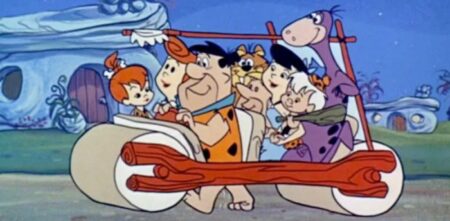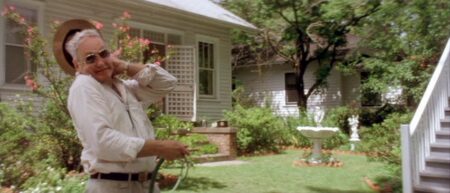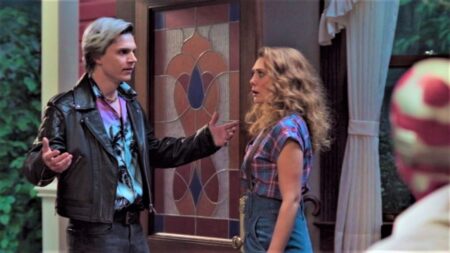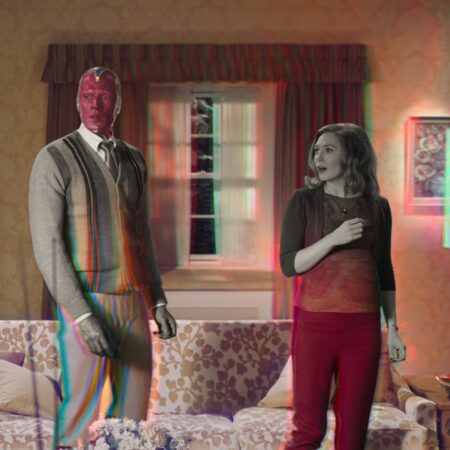In Marvel Studios’ WandaVision, we are transported to a familiar television location: suburbia – in fact, we’re almost given a history of suburbia on-screen. In episode one, we watch Wanda (Elizabeth Olsen) and Vision (Paul Bettany) live out a post-war serenity: a 1950’s North American suburban town called ‘Westview’, where, early events see the couple manage nosy neighbours, frustrating bosses and a troublesome ‘talent show’ performance. However, as soon becomes clear, all is not what it seems.
Indeed, as we travel through a history of sitcom – each episode fast-forwards ten years, with episode two occurring in the 1960s; episode three/four, the 1970s; episode five, the 1980s; and, episode six, the 1990s/2000s – it becomes clear that the everyday concerns of a young suburban family goes far beyond the episodic trials and tribulations that usually impact our television sitcom families. Something’s up – and it looks like Wanda has ‘taken over’ an actual US town, controlling its residents through a form of mind control that keeps them trapped within the sitcom narratives that she seemingly writes and directs. Wanda is the director to her own sitcom, and it’s clear that she is doing this to escape from a number of past traumas (the death of her brother, ‘Pietro’, and Vision).
It is in managing this trauma that I believe the show’s suburban location proves notable.
Suburban Sadism: An anywhere and everywhere utopia
In her chapter, Nowhere Else: On Utopia, Juliet Flower MacCannell, draws a link between the traditional suburban location and the Freudian unconscious. For MacCannell, suburbia reflects an ‘everywhere/anywhere utopia’; one she ties to a ‘Neoconservative/neo-liberal theory [that] frames its utopia as a space(less)-time(less) that fully saturates the drives once consigned or confined to the unconscious’ (2013, p. 232). While the ‘concrete expression’ of such a utopia finds itself anchored in a neutralised suburban locale – a site whose distinct lack of history and anaesthetized architectural aesthetics bears no immediate connection to the troubles of crime, social inequality or deprivation – it, nonetheless, remains a ‘site where the plethora of ready-to-wear satisfactions are supposedly freely enjoyed’ (MacCannell, 2013, p. 232).
In fact, this ‘anywhere’ location of free enjoyment serves to neutralise not only our present, but also our pasts. While Terry Eagleton highlights that ‘The 18th-century fascination with utopia went hand-in-glove with imperial expedition’, he points out that ‘One of the functions of the genre was to bring cultural difference under the sway of Western identity without thereby abolishing the exoticism which made the Tartars or Tongans worth writing about in the first place’ (Eagleton, 2005, p. 29). Where else is this ‘exoticism’ so easily managed than in the cartoon sitcom the Flintstones, ‘for which the remote past is just American suburbia plus dinosaurs’ (Eagleton, 2005, p. 29); where families work the quarry, invite the neighbours round and watch the latest film at their drive-in cinema… family dinosaur included. What MacCannell brings to bear however, is the extent to which this domesticated neutralization of the ‘exotic’, proves an archetypal feature in the suburban elicitation of superegoic injunctions.
Tied to guilt, the superego remains that injunction to Enjoy!: a command whose deliverance serves an unrelenting bearance upon the individual (Žižek, 2008). It is here that MacCannell associates the utopian vision, so readily tied to our suburban locations, with an inherent lack – the ‘nowhere’ yet ‘everywhere’ aesthetics of the suburban location proving to be ‘a dénouement that turns out to be only the bland, blank anywhereness of global sadism-as-suburbia’ (2013, p. 234). In so doing, we are left with a utopia whose very superego command becomes the traversal of the Law itself. Note the following television examples:
In contemporary cultural images, suburbia is depicted as that special non-place where incest and murder are no longer punishable transgressions, and where the drives that fuel them need no longer be repressed or even symbolically sacrificed. See the infamous show, Desperate Housewives, where murder, child abuse, pederasty and incest flourish on the Wisteria Lane of suburban Fairview. Or take the BBC’s Murder in Suburbia, which uncovers the wild sexual lives led by murder victims, lives that often shock the two young women detectives, but not the victims’ blasé neighbors, who are not only fully cognizant of these sexual aberrations but often their cheerful co-participants. (MacCannell, 2013, p. 232).
Indeed, this murky-underside is echoed in David Lynch’s Blue Velvet (1986), whose opening scene depicts the day-to-day activities of suburban life: white-picket fences, waving firemen, manicured lawns and neat rose bushes, only to then zoom in on what must be conceived as an insignificant occurrence – a man watering his garden. The man’s sudden stroke is followed by a close zoom shot of the insects and disgusting underbelly working away ‘within’ the suburban garden.
While Lynch’s depiction offers an account of the murky underside sitting behind – or within – our apparent suburban tranquillity, MacCannell’s work offers a unique take on the suburb’s ‘will-to-jouissance’; how the suburb is, effectively, ‘an effort to control this unruly and unmanageable excess’ (2013, p. 233). In short, the fictional suburb becomes a utopic site where our excessive transgressions are enacted; or, at least, in reality, becomes the site where such excessive transgressions are fantasised. What is more, this ‘will-to-jouissance’, a marker of the pleasure in pain that underscores Lacanian accounts of jouissance, bears a unique significance to the unconscious: a ‘no-place’ where one’s antipathy, frustrations and, more importantly, one’s trauma, find their expression.
Suburban Illusion – The paradoxes of control
It is important not to conflate Wanda’s ‘Westview’ as the site where her repression and unconscious – that is, her ‘hidden depths’ – are simply enacted. Importantly, for Lacan (2004), the unconscious is written like a language, and, thus, finds itself reflected in the faux pas, ‘Freudian slips’ (parapraxis) and failed attempts that litter and shape our lives. It is also a site where trauma finds its displacement. Accordingly, while we await the conclusion, it is clear that the suburban location offers Wanda some form of displacement – an ‘escape’ – from the trauma of losing those close to her. In the fictional Westview, Vision and Pietro are ‘reborn’ (or, ‘recast’), and she’s also started a family. In each episode, however, the trauma of her past suddenly reappears, often in rather sudden and banal occurrences (an appearance that one can trace to Lacan’s evocation of the Real in the symbolic [see Žižek, 2017]).
Though what remains unique to Wanda’s predicament is the very sudden lack of control that she seems to have over the town. Admittedly, while there is a government agency – the Marvel Universes’, S.W.O.R.D. (Sentient Weapon Observation and Response Division) – waiting outside the town’s periphery, over the course of each episode, the town’s residents (i.e. the various sitcoms’ characters) manage to briefly ‘escape’ from Wanda’s sitcom trance. This is followed by Vision who begins to realise that Wanda may be controlling him. In fact, it becomes clear to Vision that he is living a television script. In one scene (while in the presence of Vision), a neighbour asks Wanda if she wants her to ‘redo’ the scene.
Is Wanda’s ‘paradox’ of control not central to the forms of decentralized control that the suburb seeks? Here, Richard Sennett notes how:
Most so-called progressive town planning has aimed at a very peculiar kind of decentralization. Local units, garden suburbs, town or neighbourhood councils are formed; the aim is formal local powers of control, but there is no real power that these localities in fact have. In a highly interdependent economy, local decision about local matters is an illusion. (Sennett, 1976, p. 310).
Wanda’s life in Westview is entirely an illusion, albeit perhaps an important one. While we can perceive the suburbs as the setting for a number of middle-class frustrations (your dog barks too loud, your wall extends too far onto my property, why are the binmen late today?), they can also serve as a site of violence, and not just the fictional kind (such as that seen in Desperate Housewives). In 2005, Parisian suburbs were set ablaze amidst a three-week period of riots. As Slavoj Žižek notes, it is important not to fall to ‘hermeneutic temptation’, that is, to ‘search for some deeper meaning or message hidden in these outbursts’; instead, the events act out an ‘impotency’ on behalf of its enactors, one that reflects a ‘lack of what Fredric Jameson has called “cognitive mapping”’, defined as ‘an inability to locate the experience of their situation within a meaningful whole’ (Žižek, 2007, pp. 323-324). It is on this basis that we can view the suburban significance of Wanda’s ‘sitcom escapism’ as an attempt to achieve some form of familial consistency (hence, the turn to ‘sitcom’) and, more importantly, draw attention to the impotency of its trapped, mind-controlled ‘residents’.
Suburban Utopia – The need for ‘somewhere else’
In his account of the film, Captive State (Wyatt, 2019), Žižek (2020) highlights how the typical fictional narrative – an alien invasion that must be resisted – takes place within a decrepit Chicago suburb. Though a far cry from the Westview suburbia, Žižek emphasises how the fictional narrative should not be seen as ‘simply mirroring our reality’ (2020, p. 101). Rather, ‘The aliens-rule-us dimension is not just a fictional version of our reality, it is an immanent component of this reality itself. … In-between reality and (science-)fiction, there is thus the fictional component constitutive of our reality itself’ (Žižek, 2020, p. 101). To an extent, Wanda’s fictional entrapment of the town’s residents lays bare this ‘fictional component’.
What’s more, within the superego injunction to ‘Enjoy’, there is the inevitable response that one’s enjoyment is never enough, thus serving to tie us ever more closely to the original injunction (Black, 2020). This sense of ‘entrapment’ avers a notable resemblance to the fictional entrapment faced by the Westview residents’ held under Wanda’s ‘superhero-powers’. Though not an alien, Wanda’s inherent alienness – a point underscored by her very superhero ‘otherness’ – proves powerful in subjecting the residents to a never-ending, ‘nowhere’ existence; one that simply passes through the day-to-day trivialities of a family-centred, suburban sitcom narrative.
Indeed, the formal significance of the sitcom genre that is adopted in WandaVision accurately conveys, I believe, a far more worrying, and, perhaps, frustrating existence that plagues our current ‘everyday’ lives; one exacerbated by the COVID crisis. While a path of cynicism proves an easy, yet unsuccessful attempt to traverse these frustrations – with cynicism itself a prevailing form of ideology – we seem to remain, much like the Westview residents as well as Wanda herself, exempt from the very act of distinguishing or even believing in a utopia that can be thought of as ‘somewhere else’ (MacCannell, 2013).
As yet, we’re unsure how WandaVision will end: while the suburban haven created by Wanda may require a more fundamental confrontation with the displacement of her trauma, equally, we remain unsure of our post-COVID future. Set against any superego injunction and removed from the empty, non-places that our utopian fantasies so easily project (the endless variety of ‘nowhere’ yet ‘everywhere’ locations… ‘pop-up’ pubs are, essentially, all the same; shopping centres, food courts are all, invariably, the same), perhaps, we can follow MacCannell’s path in linking a utopian elsewhere to a more fundamental confrontation with the Real as ‘impossible’ – ‘an entirely new, transmissible experience of the Thing’ that WandaVision so accurately portrays… one that may remind us not to ‘deceiv[e] ourselves … to its horror and its pleasure’ (MacCannell, 2013, p. 234).
Jack Black is a Senior Lecturer at Sheffield Hallam University. His research examines the interlinkages between culture and media studies, with particular attention given to cultural representation and ideology. His forthcoming publication Race, Racism and Political Correctness in Comedy – A Psychoanalytic Exploration (Routledge, 2021) critically considers the importance of comedy in challenging and redefining our relations to race and racism.
Bibliography
Jack Black, “Football is ‘the most important of the least important things’: The Illusion of Sport and COVID-19,” Leisure Sciences, 2020.
Jacques Lacan, The Four Fundamental Concepts of Psycho-Analysis, edited by Jacques-Alain Miller and translated by Alan Sheridan. London, UK: Karnac, 2004.
Juliet Flower MacCannell, “Nowhere Elsewhere: On Utopia,” in Penumbra, edited by Sigi Jöttkandt and Joan Copjec, 227—238. Melbourne, Aus: re.press.
Richard Sennett, The Fall of Public Man. London, UK: Penguin, 1976.
Slavoj Žižek, “Some politically incorrect reflections on violence in France and related matters,” in The Universal Exception, edited by Rex Butler and Scott Stephens, 304—327. London, UK: Continuum.
Slavoj Zizek, Enjoy Your Symptom! Jacques Lacan in Hollywood and Out. New York, NY: Routledge, 2008.
Slavoj Zizek, Incontinence of the Void: Economico-Philosophical Spandrels. Cambridge, MA: The MIT Press.
Slavoj Zizek, Hegel in a Wired Brain. London, UK: Bloomsbury, 2020.
Terry Eagleton, Figures of Dissent: Critical Essays on Fish, Spivak, Zizek and Others. London, UK: Verso, 2005.







